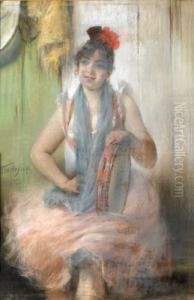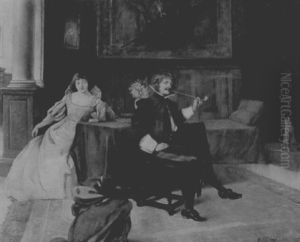Angelo Trentin Paintings
Angelo Trentin was an Italian sculptor known for his modernist and abstract works that often explored human forms and existential themes. Born in 1925 in Italy, Trentin's early life was set against the backdrop of political upheaval and the Second World War, which influenced his artistic sensibilities and the themes that he would explore throughout his career.
Trentin’s work was primarily in the medium of sculpture, but he was also proficient in drawing and painting. His sculptures often displayed a mastery of form and a deep understanding of the materials he worked with, which included bronze, stone, and wood. He was interested in the tension between the natural and the abstract, creating pieces that, while grounded in the human figure, were often abstracted to emphasize form and emotion over realistic depiction.
During his career, Angelo Trentin participated in numerous exhibitions, both solo and group, and his work was well-received by critics and collectors. He was part of a generation of artists who were working to redefine Italian sculpture in the post-war period. His art was not only a reflection of the aesthetic movements of his time but also a personal exploration of the human condition.
Trentin's contributions to the field of sculpture extended beyond his own practice. He was also involved in teaching, inspiring a new generation of artists through his techniques and his philosophical approach to art. He stressed the importance of understanding the intrinsic properties of sculptural materials and the need for the artist to engage with these materials in a dialogue, allowing the forms to emerge organically from the process of creation.
Angelo Trentin passed away in 1992, leaving behind a legacy of work that continues to be studied and admired for its unique blend of the abstract and the humanistic. His sculptures can be found in public and private collections throughout Italy and beyond, and they continue to inspire discussions about the nature of form and the role of sculpture in expressing the complexities of the human experience.













